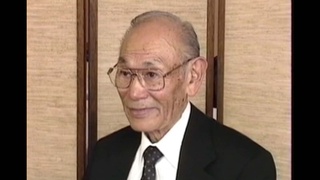Interviews
Political motivation to keep the camps open until end of 1944 election
I knew that there was a very strong political reason for keeping the camps open beyond November of ‘44, which was the presidential election. I put my head together with Donna Komure, who was the young lawyer on the Commission [staff] and we both decided to hand over to Mr. Brooke a few of the documents that specifically said, “Don’t close the camps until after the election is over,” meaning we might lose votes on the West Coast if we do that [close the camps]; that the anti-Japanese group will be so angry at us. And we were able to give to Mr. Brooke two or three documents from different high-level people—the attorney general, the Chief of Staff [General] George C. Marshall, and McCloy himself—that [these papers] confirmed that there was this other reason for not closing the camps; and it was totally political [advantage].
They wanted to wait [to announce camp closings] until Mr. Roosevelt was re-elected. Then, of course, in December [1944], they announced the closing of the camps [after the president was successfully re-elected to his fourth term and after the Supreme Court ruled in favor of Endo]. Mr. Brooke was very happy to have actual proof, directly from the Archives, to show that there was this political motivation to keep the camps open until such time [after the presidential election].
Date: August 26, 1998
Location: Virginia, US
Interviewer: Darcie Iki, Mitchell Maki
Contributed by: Watase Media Arts Center, Japanese American National Museum
Explore More Videos

Prevailing Within the System
(1923–2006) Community activist. Co-founded the Manzanar Committee

Meeting Japanese Americans from the mainland in MIS
(1923-2011) Lawyer, MIS veteran, founder of Francis and Sarah Sogi Foundation

Awareness of concentration camps as a Japanese American
(1923-2011) Lawyer, MIS veteran, founder of Francis and Sarah Sogi Foundation

Manhunt
(1919 - 2005) Challenged the constitutionality of Executive Order 9066.

The Final Verdict
(1919 - 2005) Challenged the constitutionality of Executive Order 9066.


Reaction to a 1942 speech by Mike Masaoka, Japanese American Citizen League's National Secretary
(1915 - 2011) Nisei florist who resettled in New York City after WW II. Active in Japanese American civil rights movement


Feeling angry upon reading of Supreme Court case, 'Korematsu v. United States'
(b. 1955) Lawyer

Is 'Korematsu v. United States' still a threat to American civil liberties?
(b. 1955) Lawyer


Role of the redress movement in helping Nisei to open up about their wartime experiences
(b. 1946) Lawyer

How he got into politics
(b. 1931) U.S. Former Secretary of Transportation

Search of family home by the FBI following the bombing of Pearl Harbor
(1937 - 2021) Teacher

